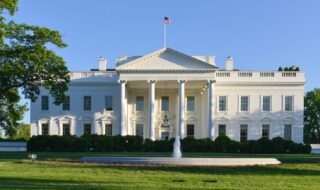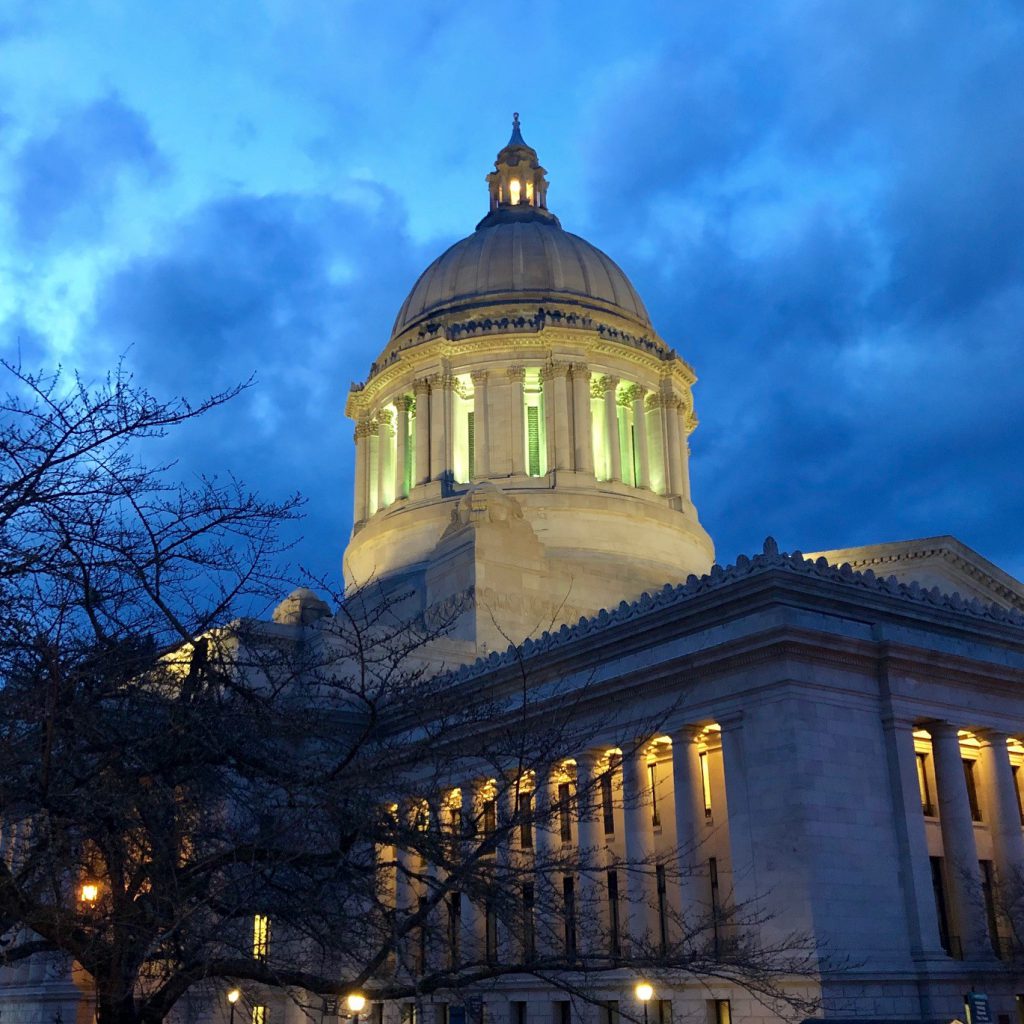February 19, 2021
NFIB Washington Legislative Update | Week 6
State Director Patrick Connor reports from Olympia on the legislative and political week ending February 19
Thanks to the first policy cut-off, roughly 25% of bills NFIB is tracking have died for the session. That number will increase after Monday’s (February 22) deadline for bills with a budget impact to be approved by a fiscal committee. Keep in mind that any bill with a fiscal impact can be deemed “necessary to implement the budget” (NTIB), and exempted from all deadlines.
#OpenSafeOpenNow
SB 5114 has officially died in the Senate State Government & Elections Committee. While the committee chair, state Sen. Sam Hunt of Olympia, gave the bill a courtesy hearing, all efforts to move it forward were rebuffed. This was despite compelling testimony from impacted small business owners, a record-setting list of more than 1,500 people who signed-in to support the bill in committee, and grassroots efforts by NFIB members and many others who contacted Sen. Hunt, Senate Majority Leader Andy Billig, and their own state senator, asking that the bill receive a vote.
Meanwhile, all regions of the state have now moved into Phase 2 re-opening. This now includes the south central region, which had been incorrectly excluded due to a reporting error by one Walla Walla hospital.
Gov. Jay Inslee is expected to announce next week which regions will continue in Phase 2, or revert back to Phase 1. The governor and state Department of Health still have not released any information about what Phase 3 may look like.
Environment
- HB 1053 – Delaying implementation of the state’s plastic bag ban is eligible for a vote by the state House of Representatives. NFIB supports the bill.
- HB 1084 – Decarbonizing commercial and residential structures was substantially re-written in the House Environment & Energy Committee. The most onerous mandates were stripped from the bill, but it would still allow municipalities to adopt separate amendments to the state’s energy code, which would create a patchwork of differences between local jurisdictions, and the bill would prohibit new natural gas hookups outside proscribed areas. NFIB opposes the bill.
- HB 1091 – Establishing a low-carbon fuel standard (LCFS) continues to move forward. It received a public hearing in House Transportation, and is scheduled for executive action this afternoon (Friday, February 19). It is surprising that the bill has been subject to hearings in three committees – House Environment & Energy, House Appropriations, and House Transportation. Typically, a bill like this would be heard by either the Appropriations or Transportation committee, not both, once approved by a policy committee. NFIB opposes the bill.
Health Care
- HB 1323 – Modifying the state’s Long Term Services & Supports program is eligible for floor consideration in the House. NFIB met with the program director today (Friday, February 19) to discuss our concerns that requiring self-employed individuals who voluntarily enroll to be permanently locked in is a disincentive to participation. The director is unwilling to consider alternative approaches at this time. NFIB opposes the bill.
- SB 5149 – Adding a monthly fee to health insurance plans to fund public health was sent to Senate Ways & Means this week, but has not yet been scheduled for a hearing in that committee. The bill was amended in the Senate Health & Long-Term Care Committee to phase in a slightly reduced fee over five years. Beginning in 2022, the increase would be about $18.50 per policy, capped at $100 million in revenue to the state. The fee would increase nearly 40¢ per policy annually, with an increasing revenue cap. In 2026, the fee would be almost $37 per policy, capped at $200 million in revenue to the state. The high cost of individual and small-group health insurance policies forces many Washington residents to be un- or under-insured today. Adding to this already unaffordable situation is the wrong approach to boosting public health funding. NFIB opposes the bill.
- SB 5399 – Establishing a universal health care commission was heard today (Friday, February 19) and is scheduled for executive action Monday (February 22) in the Senate Ways & Means Committee. The bill would create a commission that would develop a plan for a state-financed, but somehow publicly and privately delivered, health system to be implemented by 2026. NFIB opposes the bill.
Labor
- HB 1073 and SB 5097 – Expanding the state Paid Family & Medical Leave program appears to be advancing in both chambers, but in different forms. The House version was amended to be more palatable to the state’s business community. The definition of family member would be slightly expanded to include individuals, unrelated by blood, who share a household and could be considered dependents of the worker taking leave. It would reduce the required number of hours worked needed to qualify for leave during the COVID pandemic, but require separate state funding for leave taken under those circumstances to prevent a rate increase. The Senate version makes the same change to the definition of family. However, it substantially lowers the threshold to just 90 days of employment for both job protection and employer maintenance of the worker’s health insurance benefits while taking PFML. Worse yet, the Senate bill would strip the existing small business protections that exclude employers with fewer than 50 workers from these requirements. Not surprisingly, the same business associations that negotiated and supported enactment of the state’s Paid Family & Medical Leave law are poised to support HB 1073 both in the House and as an amendment to SB 5097. NFIB opposes both bills.
- HB 1076 – Allowing bounty-hunting “whistleblower” lawsuits for alleged workplace regulatory violations (also known as “qui tam” or, in California, the Private Attorneys General Act (PAGA)) was heard this week in House Appropriations, but has not yet been scheduled for executive action. The bill is effectively a greenmail scheme for trial attorneys to shakedown employers over alleged safety and health, wage and benefit, or other workplace standards violations that the state Department of Labor & Industries (L&I) has declined to pursue. NFIB opposes the bill.
- HB 1097 – Gov. Inslee’s “worker protection” legislation was approved by the House Appropriations Committee this week. The bill was previously amended in the House Labor & Workplace Standards Committee to include language from the governor’s office and L&I incorporating some suggestions from NFIB, including:
- granting more time for a small-business owner to obtain legal counsel and file suit against an L&I shutdown order
- giving L&I discretion when deciding whether to impose fines for disciplinary or other actions taken in response to an employee’s refusal to work
- aligning the penalty for a business owner who refuses to comply with a shutdown order with the penalty for a serious safety violation.
Minor revisions were made to the proposed small-business grant program that would provide full or partial financial assistance for certain safety-related expenses during a declared emergency, but the program would still be paid for by a diversion of workers’ compensation taxes paid by employers. NFIB opposes the bill.
- HB 1455 – Directing L&I and the Employment Security Department (ESD) to review federal requirements and limit disclosure of worker social security numbers in correspondence to non-governmental entities was approved this week by the House labor committee, and sent to House Rules. NFIB supports the bill.
- HB 1474 – Increasing ESD audits and penalties was also approved this week by the House Labor Committee, and sent to House Rules. NFIB opposes the bill.
- SB 5102 – Limiting independent medical examinations for workers’ compensations claims was approved this week by the Senate Labor Committee and sent to Ways & Means. The bill has not yet been scheduled for public hearing or executive action in Senate Ways & Means. NFIB opposes the bill.
- SB 5115 – Health Emergency Labor Standards Act was watered down and approved by the Senate Labor, Commerce & Tribal Affairs Committee and sent to Senate Rules this week. The bill would still deem illnesses suffered by a long list of frontline workers during a “health emergency” to be presumptively covered by the workers’ compensation system, unless the employer can prove the worker was exposed or infected away from the job. Workers’ comp claims filed under this presumption would not be charged against the employer’s experience rating. NFIB opposes expanding workers’ comp presumptions, which add cost to the system since it is tilted strongly in favor of workers. NFIB opposes the bill.
- SB 5130 – Requiring employers to provide personnel files and written explanations for disciplinary actions or termination to workers, a worker’s attorney, or other “fiduciaries” also passed the Senate Labor Committee, and was sent to Rules this week. This bill would effectively undo our state’s employment-at-will doctrine, exposing employers to litigation. NFIB opposes the bill.
- SB 5137 – Waiving the workers’ compensation cost-of-living adjustment (COLA) for one year was placed on the Senate’s second reading calendar by the Senate Rules Committee after passing Senate Labor earlier this week. Originally, the bill also included a change in the COLA formula, replacing the state’s average wage with the consumer price index (CPI). These adjustments have averaged about 7% over the past several years, while CPI increases have been 3% or less. Without a change to the COLA formula, workers’ compensation rates are expected to increase. NFIB supports the bill, despite its very limited affect.
- SB 5172 – Agricultural worker overtime retroactivity was sent to Rules after passing Senate Labor this week. The bill began as an effort to protect farmers who had followed state law exempting farmworkers from overtime. The state Supreme Court ruled that law unconstitutional. Farmers have since been paying overtime. The court decision suggested workers could sue for damages – back wages for “overtime” hours paid at straight time, plus interest – for a three-year lookback period. This bill would have precluded such suits. However, majority Democrats on the Labor Committee gutted the bill, replacing it with what appears to be a requirement for back pay, plus interest. Republican committee members, three of whom were bill sponsors, opposed the bill. (Technically, Sen. Curtis King, the committee’s ranking member and prime sponsor of the bill, didn’t vote against the amended version. He voted to advance it “without recommendation” … as a “work in progress” no doubt, hoping to fix it on the floor, we suspect.) If this new language does indeed require farmers who followed the law to pay three years of retroactive overtime, plus interest. NFIB will oppose the bill.
- SB 5355 – Authorizing wage liens against an employer’s real or personal property was approved by Senate Labor this week. The bill sets forth a cumbersome process through which a worker claiming wages are owed could file a lien against an employer’s business and/or individual assets, including the estate of a deceased employer. Community property would be subject to these liens. Depending on the property type selected, liens would be filed with county auditors and/or the state Department of Licensing. This could be in addition to the wage payment act investigation and collections process administered by L&I. NFIB opposes the bill.
Tax & Fiscal
- HB 1332 – Property tax deferrals would be allowed for qualifying small-business owners suffering COVID-19 financial losses who arrange a payment plan with their county treasurer. The bill passed the House Finance Committee this week. NFIB supports the bill.
- HB 1380 – Making permanent a B&O and public utility tax exemption for custom farming services also passed House Finance this week, after NFIB requested a hearing on the bill. NFIB supports the bill.
- SB 5096 – Establishing a capital gains tax was amended and approved by the Senate Ways & Means Committee this week and sent to Senate Rules. This version of the bill would assess a 7% tax on sales with a capital gain of more than $250,000. All real estate, retirement accounts, livestock related to farming or ranching, timber, business equipment and machinery that is immediately expensed, and capital assets owned and used by sole proprietors for business purposes would be exempt from the tax, as would certain agricultural lands, and proceeds from the sale of a qualifying small business. Qualifying small businesses are those with 50 or fewer employees, and gross worldwide revenues of no more than $6 million, that have been family owned for at least eight years, and owner operated for at least five of those eight. It appears most small businesses would be exempt from the tax, but NFIB is reviewing this version to be sure.
Previous Reports and Related News
- January 23—Week 2: Legislative Report. House passes NFIB-backed B&O tax exemption for PPP, EIDL loans
- January 15–Week 1: Legislative Report. Senate Bill Would Stop the State from Following the “Roadmap to Ruin”
NFIB is a member-driven organization advocating on behalf of small and independent businesses nationwide.
Related Articles















